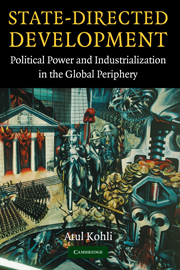Book contents
- Frontmatter
- Contents
- List of Tables and Figures
- Acknowledgments
- Introduction: States and Industrialization in the Global Periphery
- PART I GALLOPING AHEAD: KOREA
- 1 The Colonial Origins of a Modern Political Economy: The Japanese Lineage of Korea's Cohesive-Capitalist State
- 2 The Rhee Interregnum: Saving South Korea for Cohesive Capitalism
- 3 A Cohesive-Capitalist State Reimposed: Park Chung Hee and Rapid Industrialization
- PART II TWO STEPS FORWARD, ONE STEP BACK: BRAZIL
- PART III SLOW BUT STEADY: INDIA
- PART IV DASHED EXPECTATIONS: NIGERIA
- Conclusion: Understanding States and State Intervention in the Global Periphery
- Select Bibliography
- Index
1 - The Colonial Origins of a Modern Political Economy: The Japanese Lineage of Korea's Cohesive-Capitalist State
Published online by Cambridge University Press: 05 September 2012
- Frontmatter
- Contents
- List of Tables and Figures
- Acknowledgments
- Introduction: States and Industrialization in the Global Periphery
- PART I GALLOPING AHEAD: KOREA
- 1 The Colonial Origins of a Modern Political Economy: The Japanese Lineage of Korea's Cohesive-Capitalist State
- 2 The Rhee Interregnum: Saving South Korea for Cohesive Capitalism
- 3 A Cohesive-Capitalist State Reimposed: Park Chung Hee and Rapid Industrialization
- PART II TWO STEPS FORWARD, ONE STEP BACK: BRAZIL
- PART III SLOW BUT STEADY: INDIA
- PART IV DASHED EXPECTATIONS: NIGERIA
- Conclusion: Understanding States and State Intervention in the Global Periphery
- Select Bibliography
- Index
Summary
A full account of South Korea's economic dynamism in the second half of the twentieth century must begin with developments in the first half of the century. The argument is that the Japanese colonial influence on Korea, from 1905 to 1945, was important in shaping a modern political economy that later evolved into a high-growth path to development. Japanese colonialism differed in important respects from European colonialism. As late developers, the Japanese made extensive use of state power for their own economic development and then used the same state power to pry open and transform Korea in a relatively short period. The Japanese colonial impact was thus more intense, more brutal, and deeply architectonic in comparison with European colonialism. It also left Korea with three and a half decades of economic growth (the average annual growth rate in production was more than 3 percent). When judged against the standards of such other colonial economies as India and Nigeria (though not Brazil, which had also experienced significant economic growth by midcentury), the result was a relatively advanced level of industrialization.
More specifically, the colonial origins of three patterns that we now readily associate with the South Korean “model” are traced below. First, I discuss how the Korean state was transformed under Japanese influence from a relatively corrupt and ineffective agrarian bureaucracy into a highly authoritarian, penetrating organization, capable of controlling and transforming Korean society.
- Type
- Chapter
- Information
- State-Directed DevelopmentPolitical Power and Industrialization in the Global Periphery, pp. 27 - 61Publisher: Cambridge University PressPrint publication year: 2004
- 2
- Cited by



